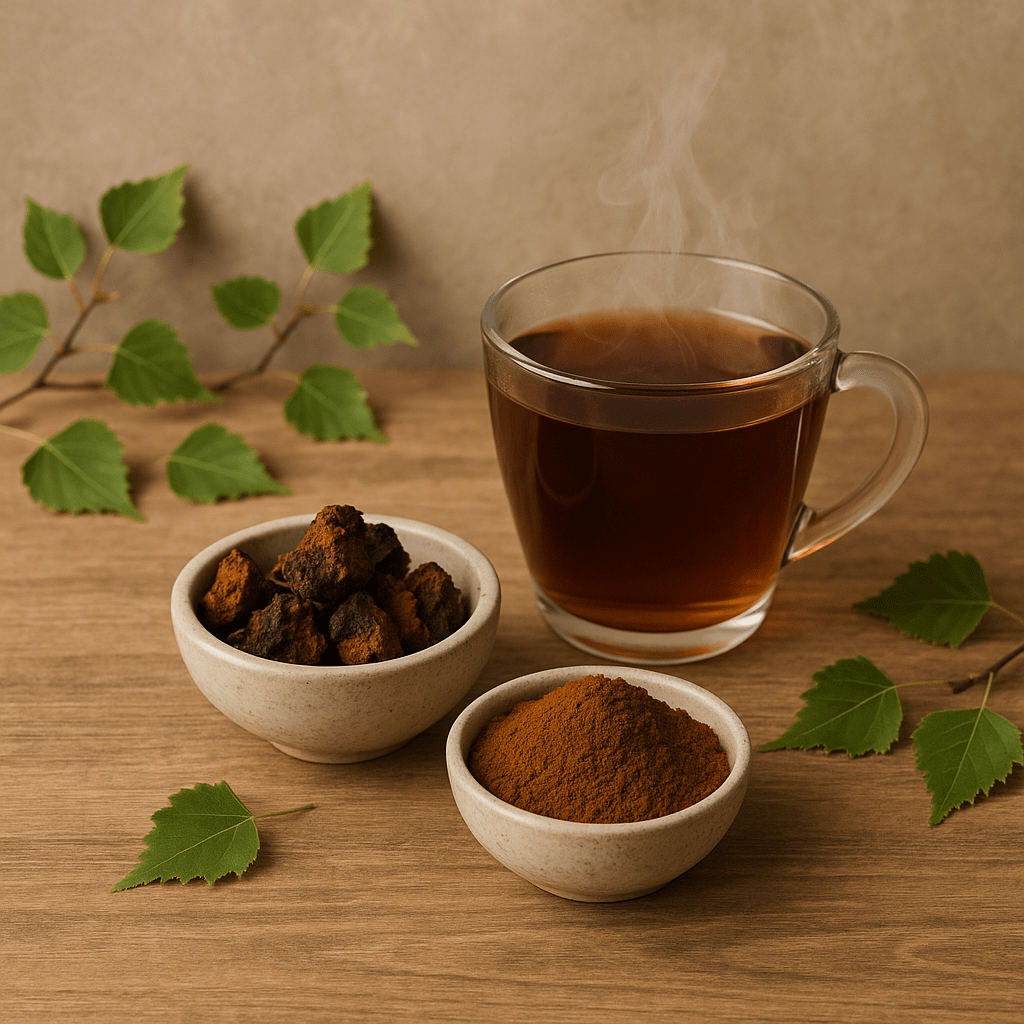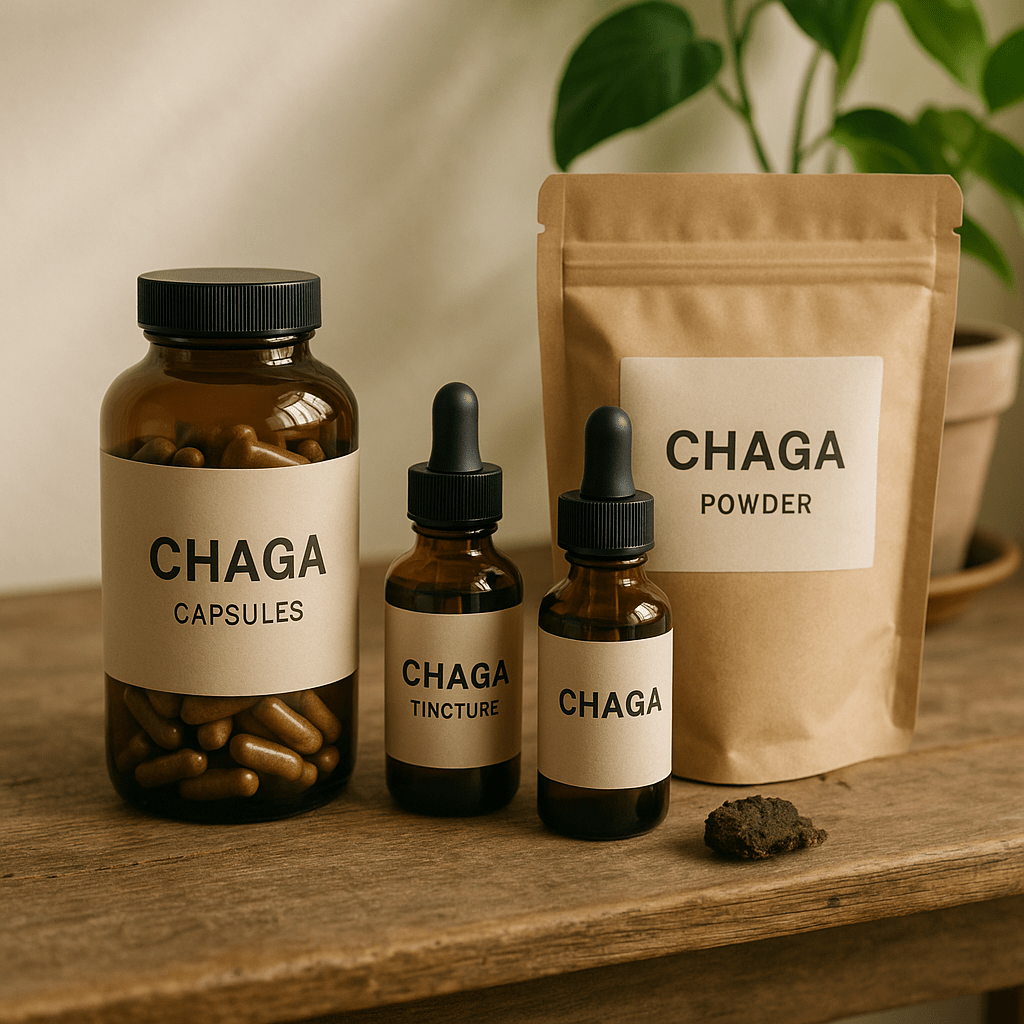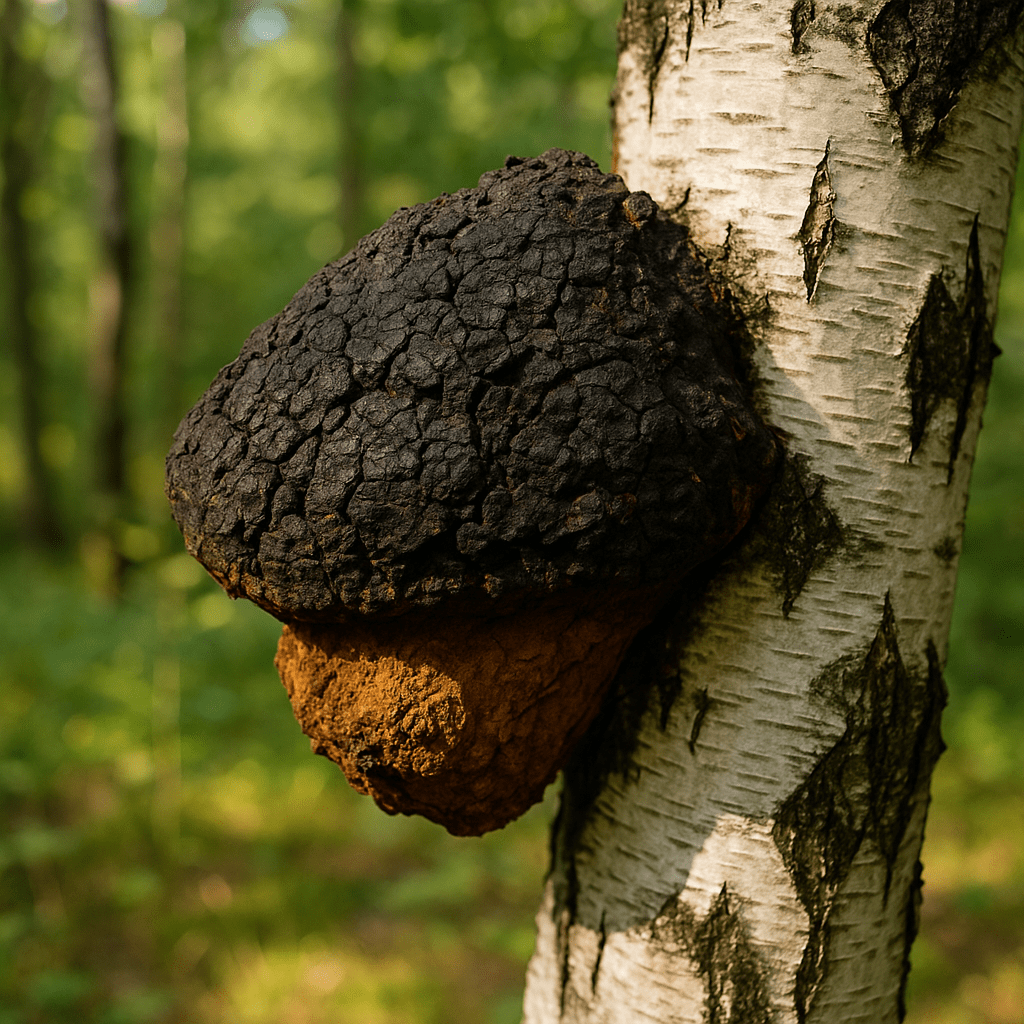Chaga mushroom is a unique birch parasite that is gaining increasing attention both in Lithuania and around the world due to its powerful antioxidant and immune-boosting properties. This dark-looking mushroom, which grows in the forests of our country, Siberia and other northern regions, has been used in traditional medicine for centuries, and now its benefits are increasingly recognized by modern scientists.
In this article, you will learn about the origin and biology of chaga mushroom, the valuable compounds it contains, scientifically proven health benefits, appropriate methods of use and possible precautions. We will introduce you to why chaga is considered one of the most valuable adaptogens in nature and how it can become part of your healthy lifestyle.
What is chaga mushroom?
The chaga mushroom, scientifically known as Inonotus obliquus, is a parasitic fungus that grows primarily on the trunks of living birch trees. Unlike many other mushrooms, chaga does not form the usual fruiting bodies with a cap and stalk. Instead, we see irregularly shaped, black, charcoal-like growths on tree trunks.

Chaga mushroom is most common in the northern regions – Lithuania, Russia (especially Siberia), Northern Europe, Korea and the colder regions of North America. It grows best in cool climates, so it is most often found in birch forests, where the temperature rarely rises above 25°C.
Chaga has been used in traditional medicine for centuries. Siberian shamans and folk healers considered this mushroom to be a strong immune system booster and a general tonic for the body. Although chaga was also known in our lands, it gained the greatest recognition in Slavic medicine, where it was used to treat various gastrointestinal disorders, liver diseases and even some forms of cancer.
Scientists from the Russian Medical Research Institute began studying the properties of chaga in the middle of the 20th century, and today research is being conducted in various scientific centers around the world in order to find out all the possible properties and benefits of this unique mushroom for the human body.
Chemical composition and active ingredients of chaga mushroom
Chaga mushroom is distinguished by its exceptionally rich composition of biologically active compounds, which makes it considered one of the most valuable adaptogens in nature. It is these compounds that give chaga its unique properties.
One of the most important components of chaga are polysaccharides, especially beta-glucans. These compounds have shown in studies the ability to modulate the activity of the immune system, stimulating the body’s natural defense against pathogens. Scientific studies show that chaga polysaccharides can activate macrophages and other immune defense mechanisms.
Chaga mushroom has been found to contain an exceptionally high amount of antioxidants, with an ORAC value (antioxidant capacity) that is one of the highest among natural products – even higher than in such “superfood” products as blueberries or goji berries. Melanin, one of the pigments found in chaga, acts as a powerful antioxidant, helping to neutralize free radicals and reduce oxidative stress.
Other important compounds found in chaga:
- Triterpenoids (including betulinic acid) – compounds with anti-inflammatory properties
- B vitamins – important for nervous system function and energy production
- Vitamin D – rarely found in mushrooms, important for the immune system and bone health
- Minerals – selenium, zinc, manganese, which act as cofactors for various enzymatic reactions
- Adaptogenic compounds – help the body adapt to stress
Studies published in sources such as the Journal of Ethnopharmacology and International Immunopharmacology confirm that these compounds, when acting together, create a synergistic effect, strengthening the body’s overall resistance and health.
Compound group Effect on the body
Polysaccharides (beta glucans) Immunomodulatory, anticancer
Triterpenoids Anti-inflammatory, antiviral
Melanin and other antioxidants Protection against free radicals, slowing down the aging process
Phytosterols Cholesterol regulation
Key Health Benefits of Chaga Mushroom
A wealth of scientific research confirms the diverse benefits of chaga mushroom to the human body. Let’s take a look at the key benefits of this unique birch mushroom, many of which have been proven by scientists and are increasingly recognized in modern medicine.
Strengthening the immune system and anti-inflammatory protection
Chaga mushroom has the unique ability to strengthen the immune system – the human body’s defense shield against infections and diseases. The main immune-boosting effect is due to the beta-glucans and other polysaccharides in chaga, which stimulate the activity of macrophages and other immune cells.
A study published in the journal Nutrients in 2020 showed that chaga extract can increase the activity of natural killer (NK) cells by as much as 300 percent. These cells are the body’s main defense against viral infections and cancer cells.
Chaga also has strong anti-inflammatory properties. Studies show that its compounds can inhibit NF-kB signaling pathways, key regulators of inflammatory processes in the body. This is especially important in combating chronic inflammation, which is associated with many modern diseases, including cardiovascular disorders, diabetes, and autoimmune diseases.
Due to its adaptogenic properties, chaga helps the body adapt to stress conditions and maintain homeostasis, which further strengthens the body’s overall resistance. For those interested in a daily supplement form, chaga mushroom capsules provide a standardized dose of beneficial compounds.
Antioxidant Properties and Chronic Disease Risk Reduction
Chaga stands out from other mushrooms and superfoods with its unusually high antioxidant activity. These antioxidants, especially melanin and polyphenols, neutralize harmful free radicals that cause cell damage and contribute to the aging process and the development of chronic diseases.
Scientific studies have shown that the antioxidant potential of chaga can be up to 50 times greater than that of blueberries and other superfoods. This powerful antioxidant effect helps protect DNA from damage and may have long-term beneficial effects in protecting against degenerative processes.
In the field of cancer research, there is evidence that chaga extracts can selectively inhibit the growth of certain types of cancer cells without causing harm to normal cells. In vitro and animal studies have shown the potential effectiveness of chaga against colon, liver, breast and prostate cancer cells. However, it is important to emphasize that these studies are preliminary, and chaga should not be considered an alternative to cancer treatment, but only as a potential additional element of health support.
The antioxidant effects of chaga may also help reduce damage caused by chronic inflammation, which is associated with many modern health conditions, from arthritis to neurodegenerative diseases.
Sugar and cholesterol regulation
One of the most promising areas of use of chaga mushroom is its potential ability to help regulate blood glucose levels. Studies show that the bioactive compounds in chaga may help improve insulin sensitivity and reduce blood sugar fluctuations.
A 2014 study in animals with diabetes showed that chaga extract helped lower blood glucose levels and improved glycemic control. Studies have shown that chaga may work similarly to some diabetes medications by inhibiting the activity of alpha-glucosidase, an enzyme involved in the breakdown of carbohydrates.
In addition, some studies show that chaga may help regulate lipid metabolism and reduce blood cholesterol levels. This is especially important for the prevention of cardiovascular disease. The phytosterols and triterpenoids found in chaga may help reduce total and “bad” (LDL) cholesterol levels, while increasing “good” (HDL) cholesterol levels.
While research in this area is promising, it should be noted that most of it has been conducted in laboratories or on animals, so more extensive clinical studies in humans are needed to accurately determine the extent of chaga’s effects on glucose and lipid metabolism.
Benefits for skin and signs of aging
The antioxidants and anti-inflammatory compounds found in chaga may have beneficial effects on skin health and help fight signs of premature aging. Melanin, which is particularly abundant in chaga, protects the skin from the harmful effects of ultraviolet rays and helps maintain skin elasticity.
Laboratory studies show that chaga extracts can stimulate the production of collagen, a protein responsible for skin firmness and elasticity. Reduced collagen levels are one of the main causes of skin aging and wrinkle formation, so consuming chaga may help maintain younger, healthier skin.
Due to its strong anti-inflammatory properties, chaga may be useful in combating skin problems such as eczema, psoriasis, and acne. Studies show that chaga extracts can reduce the production of inflammatory cytokines in the skin, thereby reducing
How to consume chaga?
Chaga mushroom can be consumed in a variety of ways, depending on individual needs and preferences. Each form of consumption has its own advantages and characteristics, so it is worth reviewing the most popular ways to consume chaga.

Perhaps the most traditional and widespread form of chaga consumption is as a tea or decoction. Chaga tea is prepared by pouring hot, but not boiling, water (about 80°C) over the crushed mushroom and letting it steep for 15-20 minutes. The tea prepared in this way has a dark brown color and a mildly bitter, nutty flavor.

Many consumers enjoy chaga tea for its calming effects and rich flavor, reminiscent of decaffeinated black coffee.
Chaga capsules are the most convenient and most standardized way to consume, ensuring a precise dose of active ingredients. Natural chaga mushroom supplements are especially attractive to the modern, busy person who does not have time to prepare tea or tincture. The usual recommended dose is 1-2 capsules per day, best taken with food.
Chaga powder can be added to smoothies, coffee, tea or even baking recipes. This is the most flexible way to consume chaga, allowing you to easily integrate it into your daily diet. The usual recommended daily dose is 1-2 teaspoons of powder.
Tinctures are a concentrated form of chaga, obtained by extracting the mushroom with alcohol or glycerin. The advantage of a tincture is a long shelf life and a concentrated amount of bioactive substances in a small volume. The usual dose is 30-40 drops of the tincture dissolved in water or tea, taken 1-3 times a day.
It is important to note that the optimal methods of using chaga and doses are not strictly established by the medical community. It is recommended to start with lower doses and monitor the body’s response. It is also advisable to periodically take breaks in the use of chaga (for example, after 6-8 weeks of use, take a 2-week break).
Although chaga supplements cannot replace a balanced diet and a healthy lifestyle, they can be a valuable additional tool in an overall health-enhancing strategy. Before starting to use chaga, especially if you are already taking medications or have a medical condition, it is advisable to consult a doctor or pharmacist.
Important Precautions and Potential Side Effects
While chaga mushroom is generally considered a safe natural supplement, it is important to be aware of potential precautions and side effects, especially for individuals with certain medical conditions or taking certain medications.
One of the most important precautions concerns the interaction of chaga with blood thinners. Due to its anticoagulant properties, chaga may enhance the effects of warfarin and other blood thinners, increasing the risk of bleeding. Individuals taking these medications should avoid chaga or use it only under medical supervision.
Chaga may also interact with immunosuppressive medications, which are used after organ transplants or to treat autoimmune diseases. Because chaga stimulates the immune system, it may counteract the effects of these medications. It is recommended that such patients avoid taking chaga or use it only under the supervision of a medical professional.
Diabetic patients taking insulin or oral antidiabetic medications should exercise caution, as chaga may lower blood sugar levels and cause hypoglycemia if taken with these medications. Close monitoring of blood glucose levels and consultation with a physician regarding possible dosage adjustments are recommended.
Pregnant and lactating women are advised to avoid chaga, as there is insufficient research to support its safety in these populations. It is better to choose other, well-studied supplements that are safe during pregnancy and lactation.
In rare cases, chaga may cause an allergic reaction, especially in individuals allergic to other mushrooms. When using chaga for the first time, it is advisable to start with a low dose and monitor for rash, itching, or other signs of an allergic reaction.
It is very important to purchase chaga products from reliable sources, as wild chaga may be contaminated with heavy metals or other pollutants, especially if collected near industrial areas. Quality supplements should be certified and tested for potential contaminants.
For more information on other beneficial supplements, check out the health benefits of spirulina, which can also complement your healthy eating regimen.
Conclusions
Chaga mushroom is a unique gift of nature, the traditional value of which has been accumulated for centuries and is now confirmed by scientific research. This unusual-looking birch parasite hides a rich complex of biologically active compounds that can comprehensively strengthen human health and help the body fight the challenges of the modern world.
In summary, chaga is distinguished by its extremely strong antioxidant properties, the ability to modulate the immune system, anti-inflammatory effects and potential benefits in regulating blood sugar levels. In the category of natural adaptogens, chaga occupies a unique place due to its complex effect and safety for most users.
Despite the promising research results, it is important to remember that chaga is not a panacea that can cure all diseases. It should be viewed as an additional means that complements a balanced diet, physical activity and a healthier lifestyle. It is especially important to consult with health professionals before starting to use chaga if you have any health conditions or are taking medications.
When choosing chaga products, look for quality, standardized supplements from trusted manufacturers.

Proper dosage and periodic breaks in use will help ensure optimal benefits without unwanted consequences.
Take advantage of the opportunities offered by this valuable mushroom, but do so responsibly and in an informed manner. This will allow you to enjoy the synergistic result of millennia of wisdom and modern science – a natural remedy that helps to nurture the health of your body.
If you are interested in other types of supplements, we recommend that you familiarize yourself with the guide to the health benefits of chlorella, which can also be a valuable part of your healthy diet.
Frequently Asked Questions (FAQ)
What is chaga mushroom and where does it come from?
Chaga (Inonotus obliquus) is a type of medicinal mushroom that usually grows on birch trees in the forests of northern regions, including Lithuania. Traditionally used for its immune-boosting and antioxidant properties, it is now popular worldwide as a dietary supplement.
What are the main health benefits of chaga?
Scientific research has shown that chaga has immune-boosting, anti-inflammatory, antioxidant, and blood sugar-regulating benefits. It may also promote healthy skin and help protect against chronic diseases.
How to take chaga safely?
Chaga can be taken as a tea, powder, tincture, or capsule. Always follow recommended dosages and consult a healthcare professional before taking any supplements, especially if you have a medical condition or are taking medications.
Are there any side effects or safety concerns with chaga?
Chaga is generally considered safe, but it may interact with blood thinners or immunosuppressants, so it is not recommended for pregnant or breastfeeding women. It is important to purchase a quality product, as wild chaga may contain contaminants.
Where can I buy quality chaga supplements in Lithuania?
High-quality chaga capsules and extracts are available at reputable health food stores and online retailers. Choose certified products that ensure purity and safety.

